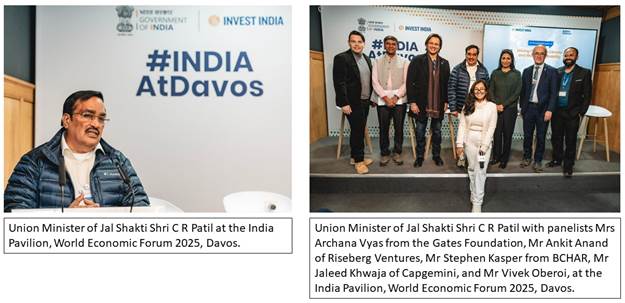At the India Pavilion during the World Economic Forum (WEF) 2025 in Davos, a high-profile discussion on “India’s WASH Innovation: Driving Global Impact in Climate and Water Sustainability” was held, spotlighting India’s transformative work in water, sanitation, and hygiene (WASH) and its significant role in global climate resilience and sustainable development.
Union Cabinet Minister for Jal Shakti, C.R. Patil, delivered the keynote address, highlighting India’s achievements through the Swachh Bharat Mission (SBM) and the Jal Jeevan Mission (JJM). These landmark initiatives have revolutionized sanitation and provided safe drinking water to millions of rural households across the country.
Minister Patil said, “This marks a significant milestone, demonstrating to the world that under the visionary leadership of Prime Minister Narendra Modi, India is not only deeply committed to water conservation but is also driving a transformative revolution in this critical sector. We have made significant strides in strengthening our water resources, setting a global benchmark for sustainable water management.”
Patil emphasized the need for global cooperation in addressing water scarcity, exacerbated by climate change, overpopulation, and overuse, and urged for collective international action.
Reflecting on the progress of the Jal Jeevan Mission, Patil highlighted the remarkable increase in rural access to safe drinking water. “In 2019, only 17% of rural households had functional tap water connections. Today, 79.66% of rural households under JJM have access to safe drinking water. This transformation is not just about water supply, but also about changing lives. Rural India now saves 55 million hours a day on fetching water, resulting in increased workforce participation, especially among women.”
The session also provided a platform to showcase India’s WASH innovations and their impact on climate resilience, emphasizing equity and inclusivity in water, sanitation, and hygiene services.
The keynote address was followed by two panel discussions: one on “Bringing Global Impact in Water Sustainability” and another on “Innovation in Global Health Through Sanitation.” These discussions featured experts from NMCG, UNICEF, WaterAid, the Gates Foundation, Riseberg Ventures, and actor-advocate Vivek Oberoi, who discussed innovations and strategies to advance water sustainability and sanitation worldwide.
India’s WASH initiatives, such as the elimination of open defecation, the construction of over 95 million toilets under SBM, and widespread household tap water connections through JJM, have established India as a global leader in addressing water and sanitation challenges.
Patil concluded by reiterating India’s role in advancing the United Nations Sustainable Development Goals (SDGs), particularly SDG 6 (Clean Water and Sanitation) and SDG 13 (Climate Action). India’s efforts, he added, have not only improved public health and education but have also created new economic opportunities and transformed lives, offering a model for other countries facing similar challenges.
The session emphasized the importance of public-private partnerships in achieving the SDGs, with discussions focusing on India’s scalable models for sustainable water management and climate-resilient practices. These insights are expected to help shape global strategies for tackling the ongoing water crisis, which threatens health, food security, and economic stability worldwide.




















